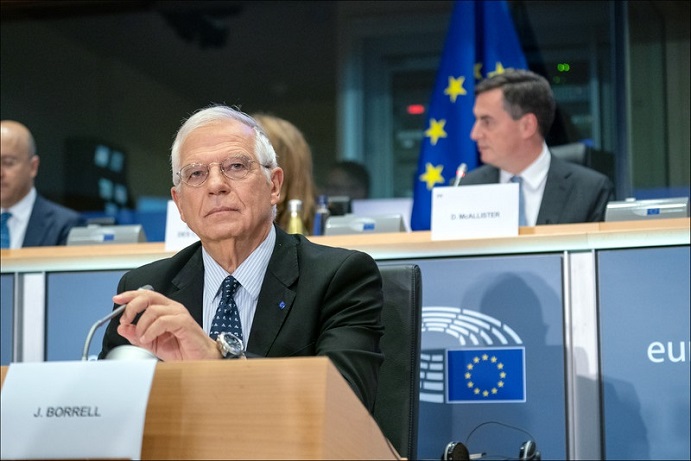
Ali Abunimah
The Electronic Intifada / April 23, 2020
The European Union has apparently backed off its threat to impose consequences on Israel if it moves to annex more occupied West Bank land.
Prime Minister Benjamin Netanyahu and Blue and White party leader Benny Gantz reached an agreement to form a coalition after a year of political stalemate and three general elections.
The coalition agreement includes a commitment that the Israeli government and parliament will, from July, proceed with votes to annex large parts of the West Bank.
According to The Times of Israel, such measures would likely pass.
On Thursday, EU foreign policy chief Josep Borrell reiterated the 27-nation bloc’s position that “any annexation would constitute a serious violation of international law.”
“The European Union will continue to closely monitor the situation and its broader implications, and will act accordingly,” Borrell added.
Of course “acting accordingly” could well mean doing nothing at all.
Watered-down language
Given how attuned EU diplomats are to the subtleties of language – and their propensity to more or less cut-and-paste from older statements – it is notable that Borrell did not repeat a much stronger line from a declaration made just a few months ago.
In early February, Borrell reacted to President Donald Trump’s plan – commonly called the Deal of the Century – which endorses Israeli annexation of large parts of the West Bank, with a rare, if not unprecedented, warning that Israel would face consequences.
“Steps towards annexation, if implemented, could not pass unchallenged,” Borrell said at the time.
As I noted then, there was little chance that the EU would actually change its longstanding approach of unconditional support for Israel as it commits violation after violation, crime after crime.
I also noted that Israel already annexed occupied East Jerusalem in 1967, and Syria’s Golan Heights in 1981 – gross violations of international law that have only been met by decades of the EU lavishing Israel with rewards.
That contrasts sharply with how the EU has imposed sanctions on Russia for its 2014 takeover of Crimea from Ukraine. In January, the EU added to those punitive measures by sanctioning Russian officials who helped organize elections in Crimea.
Israel regularly holds elections in the West Bank in which only Israeli settlers can vote. The EU habitually celebrates these segregated elections held in colonial settlements built illegally on occupied territory.
Borrell backing down from his already minimally forceful February statement sends another signal to Israel that it has nothing to fear from Brussels.
In his latest statement, Borrell pledges that the EU is “willing to closely cooperate with the new government on fighting the coronavirus.”
He adds that “technical cooperation is ongoing and will be strengthened on all aspects of the pandemic.”
Such strengthened “cooperation” in all likelihood means more EU rewards for Israel’s war industry.
Green light from Washington
The Trump administration has meanwhile given a clear green light to annexation.
On Wednesday, Secretary of State Mike Pompeo confirmed that the US views the matter as an “Israeli decision.”
That makes any potential steps by the EU to counter this unconditional US support particularly significant.
But the EU, Israel’s biggest trade partner, lacks the will and credibility to act.
Earlier this week it emerged that EU officials had warned Gantz against signing up to a government intent on annexation.
“The officials were said to caution that any such move by a potential unity government would damage Israel’s relations with the EU and elicit a strong response,” according to The Times of Israel.
Gantz paid them no heed, undoubtedly confident that the EU will continue its policy of occasional hand-wringing about Israel’s actions while showering it with goodies.
Ali Abunimah is co-founder of The Electronic Intifada and author of The Battle for Justice in Palestine, now out from Haymarket Books












